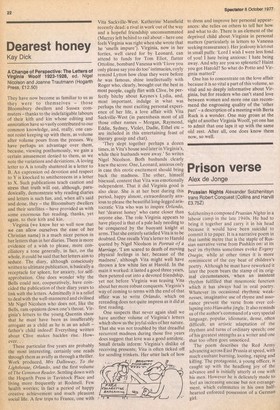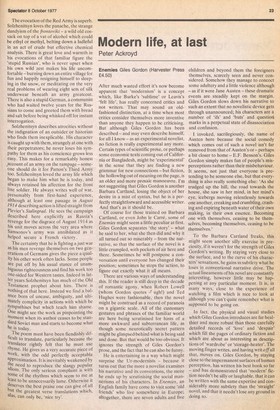Prison verse
Alex de Jonge
Prussian Nights Alexander Solzhenitsyn trans Robert Conquest (Collins and Harvill £3.75Z) Solzhenitsyn composed Prussian Nights in a labour camp in the late 1940s. He had to bring it together and carry it in his head because it would have been suicidal to commit it to paper. It is a narrative poem in that iambic metre that is the staple of Russian narrative verse from Pushkin on: at its best its rhythms sometimes evoke Evgeny Onegin, while at other times it is more reminiscent of the coy beat of children's poetry. Although he must have reworked it later the poem bears the stamp of its original circumstances, when an insistent rhythm fulfilled that mnemonic function which it has always had in oral poetry. Whatever its occasional rhythmic weaknesses, imaginative use of rhyme and assonance prevent the verse from ever collapsing into Hiawatha jingle. It also reminds us of the author's command of a very special language, popular, idiomatic, dense, often difficult, an artistic adaptation of the rhythms and turns of ordinary speech; one of his greatest strengths as a writer and one that too often goes unnoticed.
The poem describes the Red Army advancing across East Prussia at speed, with much exultant burning, looting, raping and killing. The protagonist, a young officer, is caught up with the headlong joy of the advance and is initially utterly at one with his men. However he is delicately made to feel an increasing unease hut not estrangement, which culminates in his own halfhearted enforced possession of a German girl. The evocation of the Red Army is superb. Solzhenitsyn loves the panache, the strange dandyism of the frontoviki a wild old cossack on top of a vat of alcohol which could be ethyl or methyl, belting down a ladleful in an act of crude but effective chemical analysis. There is great love and warmth in his evocations of that familiar figure the 'stupid Russian', who is never upset when his own wild zest makes his life uncomfortable burning down an entire village for fun and happily resigning himself to sleeping in the snow, or meditating on the very real problems of wearing eight sets of silk underwear beneath an army greatcoat. There is also a stupid German, a communist who had waited twelve years for the Russians to come and greeted them with bread and salt before being whisked off for instant interrogation.
Solzhenitsyn describes atrocities without the indignation of an outsider or historian who finds them inexplicable. His character is caught up with them, strangely at one with their perpetrators; he never loses his sympathy for them as his conscience grows less easy. This makes for a remarkably honest ,account of an army on the rampage -someone should do it for Patton's Third Army too, Solzhenitsyn loved the army life which began to make him what he is today, and always retained his affection for the front line soldier. He always writes well of war, Presumably from first-hand experience, although at least one passage in August 1914 describing action is lifted straight from Plevier's Stalingrad. He sees the campaign described here explicitly as Russia's revenge for the disgrace of August 1914 as his unit moves across the very area where Samsonov's army was annihilated as it helped secure a French victory.
The certainty that he is fighting a just war as his men revenge themselves on two generations of Germans gives the piece a qualny his other work often lacks. Some people are put off by his usual stance of unambiguous righteousness and find his work too One-sided for Western tastes. Indeed in latter years Solzhenitsyn has much of the Old Testament prophet about him. There is nothing of that here. Instead we find a balance born of unease, ambiguity, and ultimately complicity in actions with which he sympathises but which teach him shame. One might see the work as pinpointing the moment when its author ceases to be standard Soviet man and starts to become what he is today. The poem must have been fiendishly difficult to translate, particularly because the translator rightly felt that he must USC rhyme, He gives us a very accurate piece of Work, with the odd perfectly acceptable approximation. It is inevitably weakened by the need to reproduce the slangy popular The only serious complaint is with s, ome of the rhythms which seem to me at least to be unnecessarily lame. Otherwise it deserves the best praise one can give of all hut the greatest verse translations which, alas, can only be, 'nice try'.



































 Previous page
Previous page